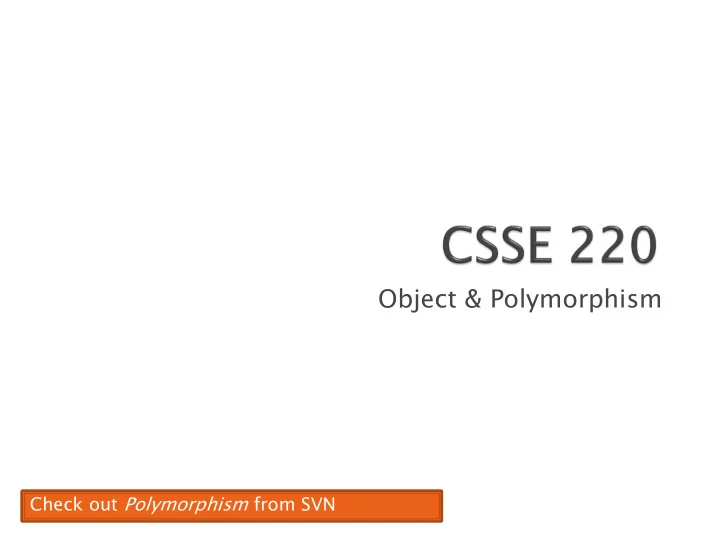

Object & Polymorphism Check out Polymorphism from SVN
Inheritance, Associations, and Dependencies
Solid line, open arrowhead = “has - a”
Dependency lines are dashed Field association lines are solid Us Use associat iation ion li lines s only ly when n an it item is is stored d as a fi field ld. . Two types of open arrowheads
Generalization (superclass) Specialization (subclass) Closed arrowhead = “is -a ”. Two types: solid line= inherits, dotted line = implements
The superest class in Java
Eve very ry class in Java inherits from Object Directly and explici citl tly: ◦ public class String extends Object {…} Directly and implicit itly ly: ◦ class BankAccount {…} Indirec irectly tly: ◦ class SavingsAccount extends BankAccount {…} Q1
String toString() Often overridden boolean equals(Object otherObject) Class getClass() Sometimes useful Object clone() Often dangerous! … Q2
Return a concise, human-readable summary of the object state Very useful because it’s called automatically: ◦ During string concatenation ◦ For printing ◦ In the debugger getClass().getName() OR getClass().getSimpleName() comes in handy here… Q3
equals(Object foo) – should return true when comparing two objects of same type with same “meaning” How? ◦ Must check types — use instanceof OR getClass().isAssignableFrom(foo.getClass()) ◦ Must compare state — use cast st Recall casting a variable: Taking an Object of one particular type and “turning it into” another Object type Q4
Review and Practice
A subclass instance is a superclass instance ◦ Polymorphism still works! BankAccount ba = new SavingsAccount(); ba.deposit(100); But not the other way around! SavingsAccount sa = new BankAccount(); sa.addInterest(); Why not? BOOM!
Can use: public void transfer(double amount, BankAccount o) { this.withdraw(amount); o.deposit(amount); } in BankAccount To transfer between different accounts: SavingsAccount sa = …; CheckingAccount ca = …; sa.transfer(100, ca);
If B extends or implements A, we can write A x = new B(); Declared type tells which The actual type tells which methods x can access. class’ version of the Compile-time error if try to method to use. use method not in A. Can cast to recover methods from B: ((B)x).foo() If x isn’t an instance of B, Now we can access all of B’s methods too. it gives a run-time error (class cast exception)
Step 1: Identify the Declared/Casted Type ◦ This is the item to the left of the variable name when the variable was declared: BankAccount sa = new SavingsAccount(); Declared Type ◦ Declared Type may be changed due to a cast: ◦ ((SavingsAccount)sa).addInterest(); Casted Type ◦ If there is a casted type, record that, otherwise use the declared type.
Step 2: Identify the Instantiation/Actual Type ◦ This is the type on the right hand side of the equal sign the last time the variable was assigned to: BankAccount sa = new SavingsAccount(); Instantiation Type ◦ Record the instantiation type
Step 3: Check for Compilation Errors Calling a method that is not available based on the declared or casted type of the object BankAccount sa = new SavingsAccount(); sa.addInterest(); Compiler Error: BankAccount does not have addInterest Incompatible type assignment SavingsAccount x = new BankAccount(); Compiler Error: BankAccounts can not be stored in SavingAccount typed variables Invalid cast: casting to a type that isn’t in the tree below the declaration type. BankAccount sa = new SavingsAccount(); ((SafetyDepositBox)sa).depositItem(); SafetyDepositBox is not below BankAccount. Cannot instantiate interfaces or abstract classes!
Step 4: Check for Runtime Errors Runtime errors are caused by invalid casting. An item may only be cast to a type IF: The instantiation type matches the casted type The casted type is between the declaration type and the instantiation type BankAcc ccou ount nt sa sa = new Savings ngsAc Account count(); (); (( ((Checking ingAccount Account)sa sa). ).ded educt uctFe Fees es(); (); Runtime Error: SavingsAccount is not a CheckingAccount Account unt a = new CheckingA kingAccount ccount(); (); (( ((BankAccoun count)a).d .depos eposit( it(); This is valid because a CheckingAccount is a BankAccount
Step 5: Find Method to Run ◦ Find the instantiation type in the hierarchy. 1. If that type implements the given method, then use that implementation. 2. Otherwise, move up to the parent type and see if there’s an implementation there. a. If there is an implementation, use that. b. Otherwise, repeat step 2 until an implementation is found.
Do questions 5 through 7 from Quiz. Please hand them in when done and then start reading the BallWorlds specification on your schedule page. Q5-7, hand in when done, then start reading BallWorlds spec
Pulsar, Mover, etc.
Recommend
More recommend